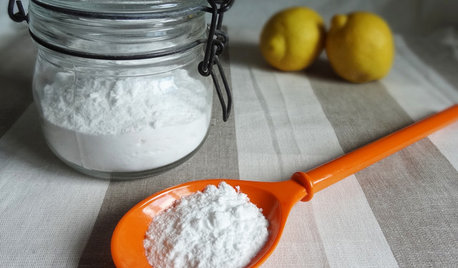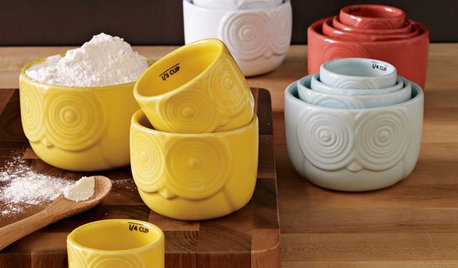Least awful oil for baking?
cloudy_christine
11 years ago
Related Stories

HOUSEKEEPINGBaking Soda: The Amazing All-Natural Cleanser You Already Own
Battle grime, banish odors and freshen clothes with this common nontoxic cupboard staple
Full Story
KITCHEN DESIGNGet Organized for Holiday Baking
Before you crack that first egg, establish a game plan for stress-free success
Full Story
PRODUCT PICKSGuest Picks: Holiday Baking 101
20 stylish finds to help crank out those Christmas cookies like a pro
Full Story
FEEL-GOOD HOMESimple Pleasures: Get Cozy on a Cold Day
Some things are best when the weather is bad. Heat up some cocoa and join the discussion
Full Story
REMODELING GUIDESWhere to Splurge, Where to Save in Your Remodel
Learn how to balance your budget and set priorities to get the home features you want with the least compromise
Full Story
KITCHEN DESIGN8 Kitchen Design Tips for Foodies
If you own at least one pricey knife and have a slew of kitchen tools, you’ll want to read this
Full Story
KITCHEN DESIGNSweet Ideas and a Truffle Recipe from a Chocolatier's Test Kitchen
A $2,100 budget didn't mean a half-baked kitchen redo; this confectioner just rolled up her sleeves and rolled out the improvements
Full Story
GARDENING AND LANDSCAPINGWhat to Know Before You Buy Teak Outdoor Furniture
Learn about finishes, weathering, care and that age-old oil debate to get the teak furnishings that suit you best
Full Story
DECORATING GUIDESHow to Love Your Kitchen More, Right Now
Make small changes to increase the joy in your kitchen while you cook and bake, without shelling out lots of dough
Full Story
LIFE10 Smart Organizing Ideas That Make Life Easier
Rethink where and how you store household basics, from bills to baking supplies, to buy some time and save some headaches
Full Story



centralcacyclist
lindac
Related Discussions
My lawn is awful! Weeds...bare spots...
Q
Bosch DW smells awful after every wash
Q
Baked Enamel OR stainless for hood liner?
Q
RECIPE: Tuscan Baked Beans
Q
Lars
cloudy_christineOriginal Author
User
User
Bumblebeez SC Zone 7
ruthanna_gw
grainlady_ks
annie1992
mabeldingeldine_gw
cloudy_christineOriginal Author
westsider40
grainlady_ks
arley_gw
cloudy_christineOriginal Author
mustangs81
cooksnsews
ovenbird
cloudy_christineOriginal Author
azzalea
grainlady_ks
sally2_gw
centralcacyclist
TxMarti
donna_in_sask
ovenbird
User
User
centralcacyclist
petra_gw
User
beachlily z9a
arley_gw
cloudy_christineOriginal Author
Pyewacket
noinwi
grainlady_ks
mabeldingeldine_gw
cloudy_christineOriginal Author
ruthanna_gw
cloudy_christineOriginal Author
ruthanna_gw
cloudy_christineOriginal Author
shambo
annie1992
Teresa_MN
User
annie1992
antiquesilver